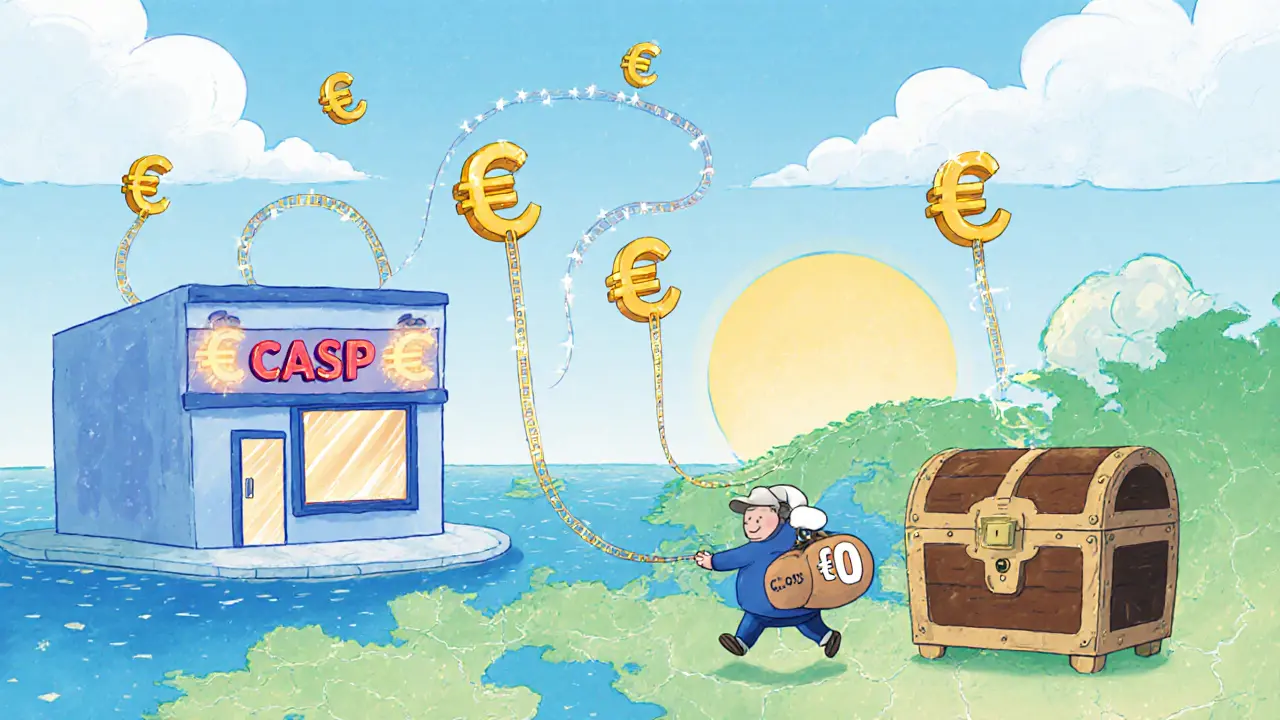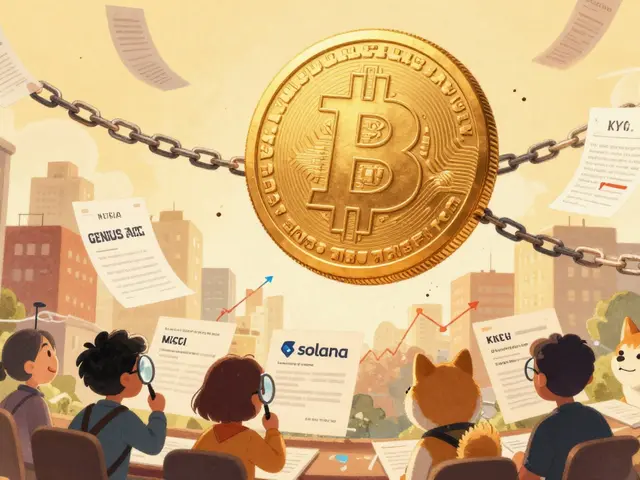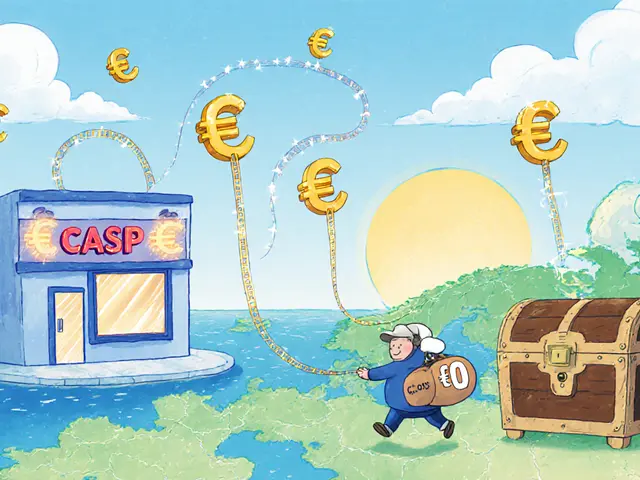EU Travel Rule Compliance Checker
Enter transaction details and click "Check Compliance Status" to see if your transfer meets EU Travel Rule requirements.
EU Travel Rule Summary
The EU applies a €0 threshold, meaning every crypto transfer between regulated providers must include full Travel Rule data. This is stricter than other jurisdictions which have higher thresholds.
Key Requirement: Even a €0.01 transaction must include sender/receiver data under EU regulations.
Key Takeaways
- The EU applies a €0 threshold, meaning every crypto transfer between regulated providers must include full Travel Rule data.
- Regulation (EU)2023/1113 and (EU)2023/1114 (MiCA) form the legal backbone; compliance was mandatory after 30December2024.
- Crypto‑Asset Service Providers (CASPs) must collect, verify, store and exchange sender/receiver info for even a single‑euro transaction.
- Non‑compliant transfers can be rejected, returned or suspended, and repeated breaches trigger enhanced due diligence or termination.
- Specialized platforms such as KYCAID can automate data exchange, but firms still need robust internal risk‑based processes.
EU Travel Rule compliance is a regulatory obligation that forces crypto‑asset service providers (CASPs) operating in the European Union to capture and share detailed transaction data for every transfer, no matter how small. The rule enforces a EU Travel Rule with a €0 threshold, making it the strictest interpretation of the Financial Action Task Force (FATF) standards globally.
What the EU Travel Rule Actually Does
The EU Travel Rule extends the classic “travel rule” - originally designed for banks - to crypto assets. When a user sends crypto from one CASP to another, the originating provider must attach the sender’s name, account number (or wallet address), location, and the beneficiary’s equivalent details. This information travels with the transaction and must be accepted by the receiving CASP before the transfer can be completed.
Because the EU set the threshold at €0, there is no de‑minimis exemption. A transaction worth 0.0001BTC triggers the same data‑collection duties as a €10000 transfer.
Legal Backbone: MiCA and Two Core Regulations
Regulation (EU)2023/1113 governs the information that must accompany transfers of funds and certain crypto‑assets. It amends Directive (EU)2015/849 and sets out the exact data fields, record‑keeping periods (five years), and reporting timelines.
Regulation (EU)2023/1114 , commonly known as MiCA (Markets in Crypto‑Assets), creates the broader licensing regime for CASPs, establishes the supervisory framework, and integrates the Travel Rule into the EU’s AML/CTF architecture.
The two pieces work together: MiCA defines who is a regulated CASP, while 2023/1113 tells those CASPs exactly what data to collect and forward.

Who Must Play by the Rules?
Any legal entity that offers crypto‑related services in the EU and is registered as a CASP falls under the scope. This includes:
- Crypto exchanges (both fiat‑on‑ramp and pure‑crypto platforms)
- Custodians and wallet providers that hold assets on behalf of customers
- Payment service providers that facilitate crypto transfers
- Decentralised finance (DeFi) bridges that have a legal presence and a VASP (Virtual Asset Service Provider) licence in an EU member state
Foreign VASPs that send funds to an EU‑registered CASP must also provide the required data, otherwise the EU counterpart can block the transfer under its risk‑based policies.
Core Compliance Obligations
- Data collection at the source: Capture sender name, address, wallet ID, nationality, and transaction value. The data must be stored in a structured format that aligns with the fields listed in Reg2023/1113.
- Beneficiary verification: The receiving CASP must check that all required fields are present. If any piece is missing, the CASP can:
- Reject the transaction outright
- Return the funds to the sender
- Temporarily suspend while conducting enhanced due‑diligence
- Risk‑based decision making: Both parties must maintain a risk‑assessment matrix that grades counterparties based on compliance history, jurisdiction risk (per the European Banking Authority’s “high‑risk jurisdictions” list), and transaction patterns.
- Record‑keeping: Store every transaction record, including the full data payload, for at least five years. The storage solution must be secure, audit‑ready, and accessible to national competent authorities upon request.
- Ongoing AML screening: Run continuous checks against sanction lists, politically exposed persons (PEPs) registers, and emerging watchlists. Screening must be re‑run whenever a sanction update occurs.
- Reporting breaches: If a counterpart repeatedly fails to provide required data, the CASP must file a suspicious activity report (SAR) with the relevant Financial Intelligence Unit (FIU) and may have to terminate the business relationship.
Technical Implementation Challenges
Meeting the EU’s zero‑threshold rule isn’t just a paperwork exercise; it requires robust technology stacks.
- Scalability: Platforms must handle thousands of low‑value transactions per second without bottlenecking the data‑exchange layer.
- Messaging protocols: The EBA recommends using the ISO20022 standard or the FATF‑endorsed Travel Rule Information Transfer (TR‑IT) format. Solutions need to support both and translate between them when dealing with non‑EU VASPs.
- Asset provenance: Verifying that a token hasn’t originated from a darknet market adds an extra data‑layer. Many CASPs now integrate chain‑analysis APIs to tag risky coins at the point of entry.
- Privacy compliance: The EU’s GDPR still applies. Data must be encrypted in transit, stored with access controls, and retained only for the legally required period.
- Integration overhead: Legacy exchanges often have monolithic order‑book engines. Plug‑in modules for Travel Rule data must be carefully architected to avoid downtime.
Comparing the EU Zero‑Threshold with Other Jurisdictions
| Jurisdiction | Threshold | Effective Date | Main Regulation |
|---|---|---|---|
| European Union | €0 (all transactions) | 30Dec2024 | Reg2023/1113 & MiCA (Reg2023/1114) |
| United States | $3,000 | Jan2024 (FinCEN final rule) | FinCEN Travel Rule amendment |
| Canada | CAD5,000 | June2023 | FINTRAC AML/CTF guidelines |
| Australia | AUD10,000 | July2023 | AUSTRAC G‑SIPS guidance |
By eliminating the de‑minimis exemption, the EU forces every market participant to build a full‑scale compliance engine, whereas other regions still allow small‑value transfers to slip through.

Solution Providers: Turning Compliance Into a Service
Several firms have emerged to help CASPs meet the EU’s strict timeline.
KYCAID offers a modular platform that handles sender‑beneficiary verification, automatic data formatting, and real‑time sanctions screening. Its API can be dropped into existing order‑matching engines with minimal code changes.
Other notable players include Chainalysis Travel Rule Gateway, CipherTrace TR‑Gateway, and Accuity’s TR‑Connect. They differ mainly in pricing models and the depth of chain‑analysis integration.
What Happens If You Don’t Comply?
Regulators in the EU can impose hefty fines - up to 10% of a company’s annual turnover - for systematic breaches. Beyond monetary penalties, non‑compliant firms face:
- Loss of licence or revocation of CASP registration
- Blacklisting by peer providers, leading to loss of liquidity channels
- Reputational damage that scares investors and users
- Potential criminal investigations if non‑compliance is linked to money‑laundering activities
Because the rule applies to every transaction, even a single missed data field can trigger an investigation.
Future Outlook: Beyond the Zero‑Threshold
Analysts expect the EU to keep tightening the framework. Coming trends include:
- Cross‑border harmonisation: The European Banking Authority is drafting guidelines to align the EU regime with FATF’s upcoming “global standard” that may expand coverage to DeFi protocols without a licence.
- Expanded participant scope: Some member states are already debating whether crypto custodians that only hold assets on behalf of institutional clients should be subject to the same rule.
- Enhanced data standards: A move toward richer metadata (e.g., transaction purpose codes) could make AML analytics more effective.
For crypto businesses, staying ahead means investing in flexible compliance infrastructure that can adapt to new data fields without a full system overhaul.
Frequently Asked Questions
Do I need to report a €0.01 transaction?
Yes. The EU’s zero‑threshold rule applies to every crypto transfer, regardless of its monetary value.
What data fields are mandatory?
Sender name, sender wallet address, sender nationality, beneficiary name, beneficiary wallet address, transaction amount, date, and the unique transaction identifier are required under Reg2023/1113.
Can I use the same compliance system for both EU and non‑EU transfers?
Yes, but the system must be able to toggle the zero‑threshold logic for EU counterparties while applying the appropriate thresholds for other jurisdictions.
What are the penalties for missing data?
Regulators can issue fines up to 10% of annual turnover, suspend your licence, and require you to file SARs. Repeated breaches may lead to permanent exclusion from the EU market.
How does the European Banking Authority define high‑risk jurisdictions?
EBA’s guidelines label any country that has not fully implemented the FATF Travel Rule, or that is on the FATF high‑risk list, as a high‑risk jurisdiction. Transfers involving such regions require enhanced due‑diligence or may be blocked.







Rampraveen Rani
October 10, 2025 AT 03:28ashish ramani
October 10, 2025 AT 15:50Natasha Nelson
October 11, 2025 AT 01:02Sarah Hannay
October 11, 2025 AT 16:28James Williams, III
October 11, 2025 AT 16:56Prabhleen Bhatti
October 12, 2025 AT 14:43Elizabeth Mitchell
October 13, 2025 AT 02:59Chris Houser
October 13, 2025 AT 06:14William Burns
October 13, 2025 AT 15:37Ashley Cecil
October 13, 2025 AT 22:23John E Owren
October 14, 2025 AT 06:46Joseph Eckelkamp
October 14, 2025 AT 10:22Jennifer Rosada
October 15, 2025 AT 03:31adam pop
October 15, 2025 AT 04:11Dimitri Breiner
October 15, 2025 AT 04:16Ralph Nicolay
October 15, 2025 AT 21:22Richard Williams
October 16, 2025 AT 20:54